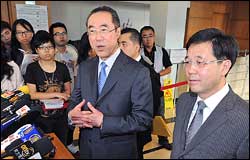
- 5_2011070421465614298Henry.jpg (10.39 KiB) Viewed 7538 times
U-turn
Colleen Lee and Natalie Wong
Tuesday, July 05, 2011
In a major U-turn, the administration has decided to defer a vote on a bill to scrap by-elections.
The vote is being held over until the next legislative year - after this summer's recess - to allow for public consultation.
The administration had insisted there was no need for people to be consulted on changing the system, which was introduced in an amendment bill in the Legislative Council last month.
The sudden about-turn followed a massive turnout in the July 1 march, with protesters urging a delay on the vote even as some pro-establishment lawmakers expressed reservations over the bill.
But the chief executive indicated yesterday he is digging in, intent on pushing through the bill before his term ends next June.
For their part, pan-democrats vow to defeat what they call an "evil bill" - as they did when the administration was forced to back away from contentious national security legislation - Article 23 - in 2003.
Chief Secretary Henry Tang Ying- yen announced the delay "in a bid to further enhance our proposal" after meeting with 21 administration- backing legislators yesterday afternoon.
A two-month consultation starting in the middle of the month will be based on the government's revised proposal unveiled last Tuesday, he said.
Asked whether the administration is bowing to public pressure from tens of thousands of protesters on July 1, Tang responded: "We feel that the proposal is constitutional and legal, as well as reasonable and rational."
Chief Executive Donald Tsang Yam-kuen vowed to plug the "loophole" that lawmakers used to trigger by-elections and which some saw as a de-facto referendum on universal suffrage within his term. He refused to be drawn on whether the administration will withdraw the bill if most people oppose the proposal in the consultation.
Under the revised proposal, the runner-up candidate in a geographical constituency or any of the five newly added district council functional constituencies will replace a lawmaker who resigns, dies or is disqualified during a four-year term.
But pan-democratic lawmakers called the consultation a fake exercise as it is based on the revised proposal. They urged authorities to withdraw the bill first.
The administration could also launch a comprehensive consultation paper with references to practices in other places, said Democratic Party chairman and legislator Albert Ho Chun-yan.
And Democrat Cheung Man-kwong noted that this is the second time Hong Kong people "have successfully forced the government to make concessions by taking to the street."
But after the consultation "it cannot be ruled out" that the administration will force through the bill if it secures enough votes in the legislature, he warned.
"Hong Kong people should get prepared to march for a third time to prevent the passage of an evil bill."
The Hong Kong Bar Association, meanwhile, issued a statement arguing that the consultation will only be meaningful if the administration publishes a consultation document discussing the rationale for the proposal and options.
Law Society president Junius Ho Kwan-yiu said: "It will be more objective to conduct a comprehensive consultation with no preset stance on legislation."
A timetable for legislative action, however, remains open to question.
Tam Yiu-chung, chairman of the Democratic Alliance for the Betterment and Progress of Hong Kong, said he respects calls from some pro- establishment lawmakers to postpone the vote.
But by deferring it, he said, a bill cannot be passed before the nomination period for district council elections later this year.
And New People's Party chairwoman Regina Ip Lau Suk-yee denied she pressured the administration. It was appropriate for the party to pass people's views to the administration, said the woman who held the security portfolio in 2003 and spearheaded the push to pass Article 23.